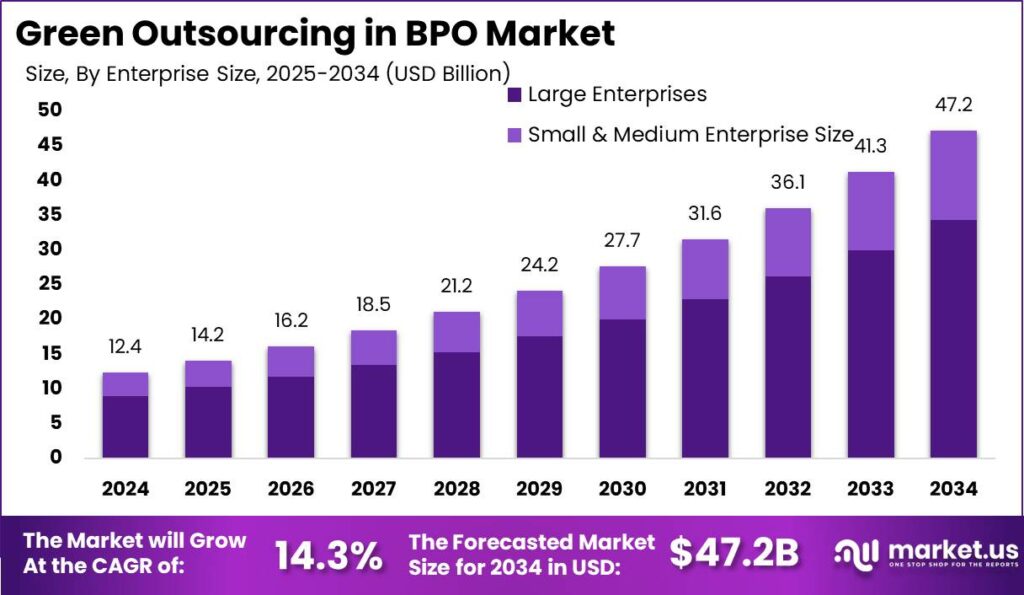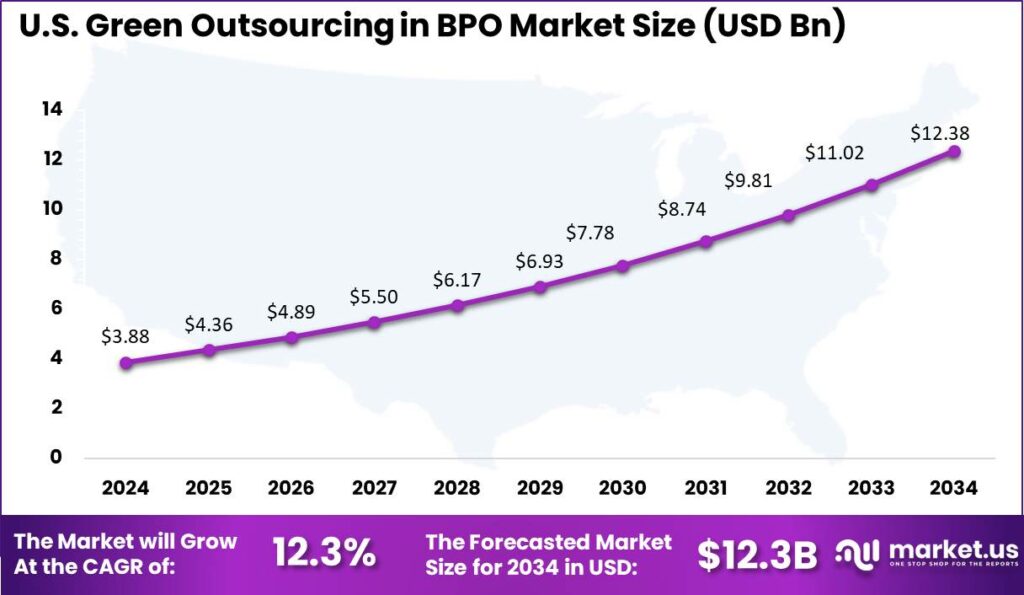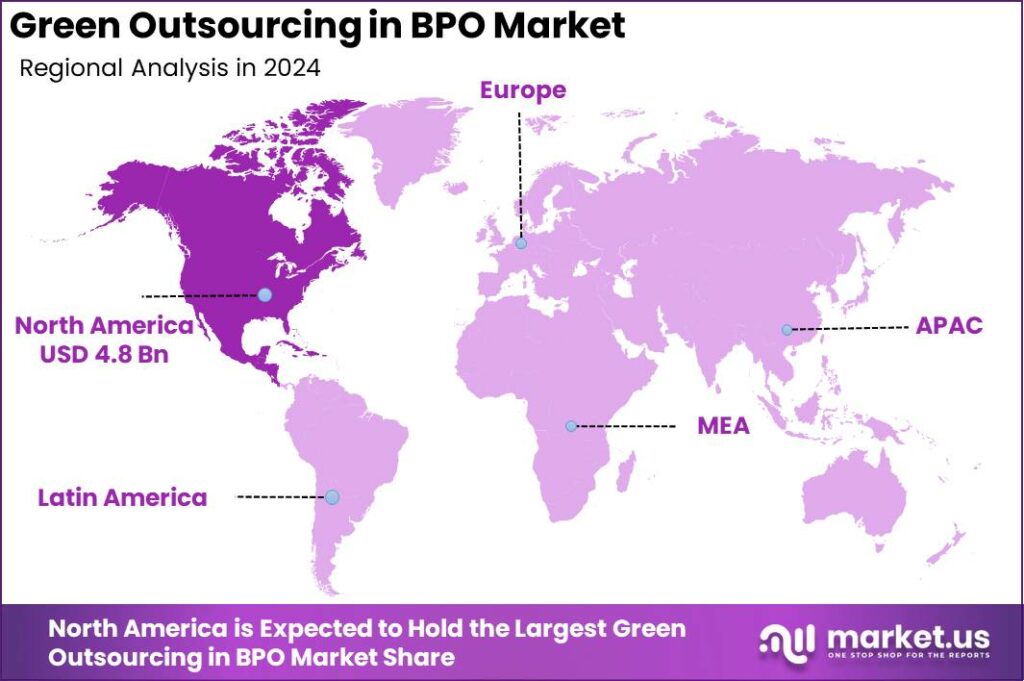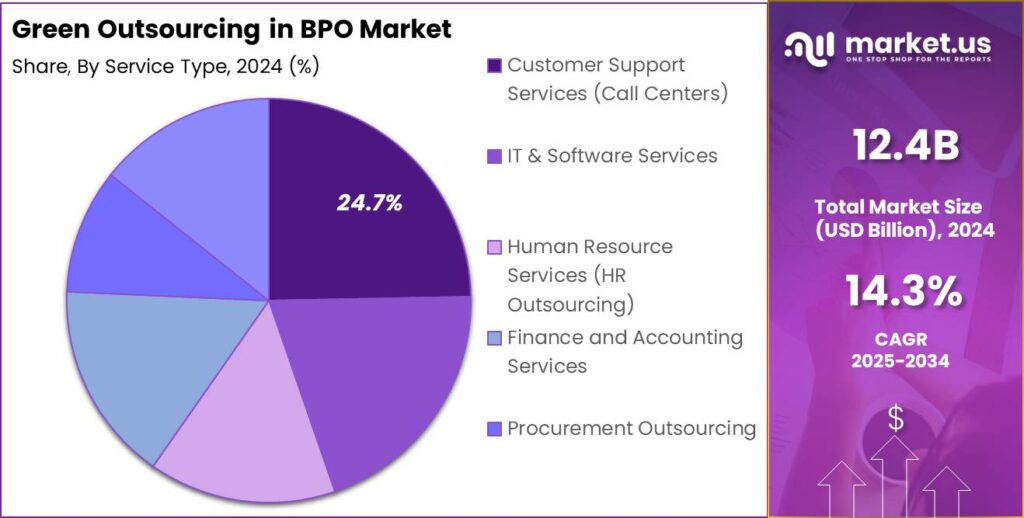Green Outsourcing in BPO Market Size, Share, Business Strategies Report By Service Type (Customer Support Services (Call Centers), IT & Software Services, Human Resource Services (HR Outsourcing), Finance and Accounting Services, Procurement Outsourcing, Others), By Enterprise Size (Small & Medium Enterprise Size, Large Enterprises), By End-User Industry (IT and Telecom, Healthcare, Retail and E-Commerce, BFSI, Automotive, Others), Region and Companies – Industry Segment Outlook, Market Assessment, Competition Scenario, Trends and Forecast 2025-2034
- Published date: Feb. 2025
- Report ID: 140660
- Number of Pages: 337
- Format:
-
keyboard_arrow_up
Quick Navigation
- Report Overview
- Key Takeaways
- U.S. Green Outsourcing in BPO Market
- Analysts’ Viewpoint
- Service Type Analysis
- Enterprise Size Analysis
- End-User Industry Analysis
- Key Market Segments
- Driver
- Restraint
- Opportunity
- Challenge
- Growth Factors
- Emerging Trends
- Business Benefits
- Key Regions and Countries
- Key Player Analysis
- Recent Developments
- Report Scope
Report Overview
The Green Outsourcing in BPO Market size is expected to be worth around USD 47.2 Billion By 2034, from USD 12.4 billion in 2024, growing at a CAGR of 14.3% during the forecast period from 2025 to 2034. In 2024, North America held a dominant market position, capturing more than a 39.2% share, holding USD 4.8 Billion revenue.
The BPO market is experiencing a significant shift towards sustainability, with an increasing number of companies prioritizing green outsourcing. This movement is driven by heightened environmental awareness, stricter regulatory requirements, and a growing demand from consumers and stakeholders for eco-conscious business practices.
The growth of the green outsourcing market in the Business Process Outsourcing (BPO) sector can be attributed to an increasing awareness of sustainability, cost-efficiency, and regulatory requirements. Companies are increasingly adopting environmentally responsible practices in their operations to comply with environmental regulations, reduce carbon footprints, and enhance corporate social responsibility (CSR) profiles.

According to a Deloitte report, 93% of CEOs believe that sustainability will be critical to their companies’ future success. This growing recognition highlights the increasing importance of sustainable practices across industries. For businesses, achieving sustainability objectives often requires both strategic changes and operational adjustments. In this context, Business Process Outsourcing (BPO) providers play a significant role.
The demand for green outsourcing in the BPO market is being driven by companies across various sectors, including IT, finance, healthcare, and customer service, looking to reduce their environmental impact. Clients are increasingly asking BPO providers for sustainability certifications, energy-efficient solutions, and waste reduction strategies.
Key Takeaways
- The Green Outsourcing in BPO Market is expected to reach USD 47.2 billion by 2034, up from USD 12.4 billion in 2024. This represents a CAGR of 14.3% from 2025 to 2034.
- In 2024, North America held the largest market share, accounting for more than 39.2%, with a revenue of USD 4.8 billion.
- The Customer Support Services (Call Centers) segment dominated the market, capturing over 24.7% of the total market share in 2024.
- In the U.S., the market size stood at USD 3.88 billion in 2024, growing at a CAGR of 12.3%.
- The Large Enterprises segment was the dominant player, holding over 72.7% of the market share in 2024. The IT and Telecom sector led the market with a share of more than 34.8% in 2024.
U.S. Green Outsourcing in BPO Market
The U.S. Business Process Outsourcing (BPO) market is projected to reach USD 3.88 billion in 2024, reflecting a compound annual growth rate (CAGR) of 12.3%. This growth is driven by the increasing adoption of cloud computing, which offers cost-effective solutions and operational flexibility.
Additionally, the demand for specialized services in sectors such as finance, healthcare, and information technology is contributing to the market’s expansion. The surge in green outsourcing within the U.S. BPO market can be attributed to several key factors.
First, there is a growing emphasis on environmental sustainability among businesses, leading to the adoption of eco-friendly practices. Second, stringent environmental regulations are prompting companies to seek BPO providers that comply with these standards.
Third, consumers are increasingly favoring companies that demonstrate environmental responsibility, influencing businesses to adopt green practices. Lastly, the potential for cost savings through energy-efficient operations is encouraging companies to invest in sustainable BPO solutions.

In 2024, North America held a dominant position in the Business Process Outsourcing (BPO) market, capturing more than a 39.2% share and generating approximately USD 4.8 billion in revenue. This leadership is primarily attributed to the region’s advanced technological infrastructure, which facilitates the seamless integration of green outsourcing practices.
The widespread adoption of cloud computing and automation technologies enables BPO providers to offer cost-effective and environmentally sustainable solutions. Additionally, stringent environmental regulations in North America compel companies to adopt eco-friendly practices, further driving the demand for green outsourcing services.
The robust economic environment in North America also contributes to its leading position in the green outsourcing BPO market. The presence of numerous Fortune 500 companies actively seeking to optimize operational efficiencies and reduce costs through outsourcing has bolstered the demand for BPO services.
Moreover, the region’s regulatory environment generally supports outsourcing practices, coupled with strong intellectual property protection regimes, making it an attractive destination for companies looking to outsource critical business functions while maintaining compliance with standards.

Analysts’ Viewpoint
The green outsourcing market presents multiple investment opportunities, particularly for businesses that offer eco-friendly technologies or sustainable outsourcing solutions. Companies specializing in renewable energy, green IT infrastructure, and cloud-based services are well-positioned to capture a growing share of this market.
One significant challenge is the initial investment required to implement green technologies, which may be prohibitive for smaller or cost-sensitive businesses. Furthermore, not all green technologies offer immediate cost savings, and the ROI (Return on Investment) may take several years to materialize.
Technological advancements are central to the growth of green outsourcing in the BPO market. Key innovations include cloud computing, artificial intelligence (AI), and automation technologies, all of which help to reduce the environmental impact of business operations. Cloud-based solutions allow for the efficient use of resources and minimize the need for on-premises infrastructure, leading to reduced energy consumption.
Service Type Analysis
In 2024, the Customer Support Services (Call Centers) segment held a dominant position in the Green Outsourcing in the Business Process Outsourcing (BPO) market, capturing more than a 24.7% share. This leadership is primarily attributed to the sector’s significant role in managing customer interactions and the increasing emphasis on sustainable practices within these operations.
Call centers are integral to businesses, serving as the frontline for customer engagement across various industries. The high volume of operations in these centers often leads to substantial energy consumption and resource utilization. Recognizing this, companies are increasingly adopting green outsourcing solutions to minimize environmental impact.
By partnering with BPO providers that implement energy-efficient technologies, utilize renewable energy sources, and promote sustainable workplace practices, businesses can significantly reduce their carbon footprint while maintaining effective customer support. Moreover, the shift towards remote work and virtual call center models has been accelerated by global events, leading to a reevaluation of traditional operational methods.
Green outsourcing in this context involves leveraging cloud-based platforms and virtual communication tools that not only enhance flexibility and scalability but also contribute to environmental sustainability by reducing the need for physical infrastructure and commuting. This transition aligns with the growing consumer and regulatory demand for corporate environmental responsibility.
Additionally, the competitive advantage gained through green outsourcing cannot be overlooked. Companies that prioritize sustainability in their customer support operations often experience enhanced brand reputation and customer loyalty. As consumers become more environmentally conscious, they are more likely to engage with businesses that demonstrate a commitment to sustainable practices.

Enterprise Size Analysis
In 2024, the Large Enterprises segment held a dominant position in the Green Outsourcing in the Business Process Outsourcing (BPO) market, capturing more than a 72.7% share. This significant lead can be attributed to several key factors that make large enterprises more inclined and better equipped to adopt green outsourcing practices.
Firstly, large enterprises often have more substantial financial resources, enabling them to invest in sustainable technologies and processes without compromising their operational efficiency. This financial flexibility allows them to partner with BPO providers that prioritize eco-friendly practices, aligning with their corporate social responsibility goals and regulatory compliance requirements.
Secondly, the complexity and scale of operations in large enterprises necessitate the adoption of standardized and efficient processes. Green outsourcing offers a pathway to streamline operations while reducing environmental footprints. By outsourcing non-core activities to specialized providers with green certifications, these enterprises can achieve operational excellence and sustainability targets simultaneously.
Moreover, large enterprises are under increasing scrutiny from stakeholders, including investors, customers, and regulatory bodies, to demonstrate environmental stewardship. Engaging in green outsourcing not only enhances their brand image but also mitigates risks associated with environmental non-compliance. This proactive approach to sustainability fosters trust and can lead to a competitive advantage in the marketplace.
End-User Industry Analysis
In 2024, the IT and Telecom segment held a dominant position in the Green Outsourcing in the Business Process Outsourcing (BPO) market, capturing more than a 34.8% share. This leadership is primarily attributed to the sector’s substantial energy consumption and its proactive measures to adopt sustainable practices.
The IT and Telecom industry is renowned for its extensive use of data centers, which are significant consumers of electrical power. As the demand for digital services escalates, these data centers require increasing amounts of energy, leading to heightened environmental concerns.
To address this, companies within the sector are increasingly outsourcing their operations to BPO providers that prioritize green practices, such as utilizing energy-efficient technologies and renewable energy sources. This strategic move not only reduces their carbon footprint but also aligns with global sustainability goals.
Moreover, the rapid technological advancements and the proliferation of devices have intensified the need for robust and sustainable IT infrastructure. By engaging in green outsourcing, IT and Telecom companies can ensure that their operations are both efficient and environmentally friendly. This approach not only enhances their corporate image but also meets the growing consumer demand for eco-conscious business practices.
Key Market Segments
By Service Type
- Customer Support Services (Call Centers)
- IT & Software Services
- Human Resource Services (HR Outsourcing)
- Finance and Accounting Services
- Procurement Outsourcing
- Others
By Enterprise Size
- Small & Medium Enterprise Size
- Large Enterprises
By End-User Industry
- IT and Telecom
- Healthcare
- Retail and E-Commerce
- BFSI
- Automotive
- Others
Driver
Environmental Sustainability Initiatives
The increasing emphasis on environmental sustainability has become a significant driver for the adoption of green outsourcing within the Business Process Outsourcing (BPO) sector. Organizations are increasingly integrating sustainable practices into their operations to meet regulatory requirements, enhance corporate social responsibility (CSR) profiles, and appeal to environmentally conscious consumers.
This strategic shift not only aligns with global environmental goals but also offers potential cost savings and operational efficiencies. Implementing green outsourcing involves partnering with service providers that prioritize eco-friendly practices, such as reducing carbon footprints, minimizing waste, and utilizing renewable energy sources.
By outsourcing certain functions to these providers, companies can leverage their specialized expertise in sustainability, ensuring compliance with environmental regulations and standards. This approach allows businesses to focus on core competencies while contributing to environmental conservation efforts.
Restraint
Data Security and Privacy Concerns
Despite the advantages, the adoption of green outsourcing in the BPO sector is hindered by significant concerns related to data security and privacy. Outsourcing business processes often involves sharing sensitive information with external providers, raising apprehensions about the protection of proprietary data and customer privacy.
The transmission of confidential data to third-party service providers increases the risk of unauthorized access, data breaches, and cyberattacks. Instances of data breaches in the past have underscored the vulnerabilities associated with outsourcing arrangements. Such incidents can lead to substantial financial losses, legal repercussions, and damage to a company’s reputation.
Furthermore, the complexity of managing data security across multiple jurisdictions adds to the challenge. Different countries have varying regulations and standards concerning data protection, making it difficult for companies to ensure consistent compliance. This complexity can result in legal and financial penalties if data protection laws are inadvertently violated.
Opportunity
Integration of Advanced Technologies
The integration of advanced technologies presents a substantial opportunity for enhancing the effectiveness and efficiency of green outsourcing in the BPO sector. Technologies such as artificial intelligence (AI), machine learning (ML), and robotic process automation (RPA) can streamline operations, reduce energy consumption, and minimize waste, thereby supporting sustainability goals.
AI and ML can optimize processes by analyzing large datasets to identify inefficiencies and suggest improvements. For example, predictive analytics can forecast demand patterns, enabling BPO providers to adjust resources accordingly, reducing energy usage and waste. Additionally, AI-driven chatbots and virtual assistants can handle routine customer inquiries, freeing up human agents to focus on more complex tasks, thereby enhancing productivity and reducing operational costs.
RPA can automate repetitive tasks, leading to faster processing times and reduced error rates. This automation not only improves service quality but also contributes to energy savings by decreasing the need for manual interventions and the associated energy consumption.
Challenge
Balancing Cost and Sustainability
A notable challenge in green outsourcing is balancing cost considerations with sustainability objectives. While adopting eco-friendly practices can lead to long-term savings, the initial investment required for sustainable technologies and processes can be substantial. This financial burden may deter companies, especially small and medium-sized enterprises (SMEs), from pursuing green outsourcing initiatives.
The upfront costs associated with implementing sustainable practices, such as investing in energy-efficient equipment, renewable energy sources, and waste management systems, can be significant. For instance, transitioning to renewable energy may require substantial capital investment, which can strain financial resources.
Growth Factors
The expansion of green outsourcing within the Business Process Outsourcing (BPO) sector is driven by several key factors:
- Environmental Awareness: There is a growing recognition of the environmental impact of business operations. Companies are increasingly adopting sustainable practices to reduce their carbon footprints and contribute to environmental conservation. This shift is evident as businesses prioritize eco-friendly initiatives in their operational strategies.
- Regulatory Compliance: Governments worldwide are implementing stricter environmental regulations. To comply with these laws and avoid potential penalties, businesses are integrating green practices into their outsourcing models. This compliance not only meets legal requirements but also enhances corporate reputation.
- Cost Efficiency: Sustainable practices often lead to cost savings. Energy-efficient operations and waste reduction can lower operational expenses. For instance, implementing energy-efficient technologies can result in significant reductions in energy consumption, leading to lower utility bills.
- Consumer Demand: There is an increasing consumer preference for companies that demonstrate environmental responsibility. By adopting green outsourcing, businesses can attract and retain customers who value sustainability, thereby enhancing brand loyalty and market share.
- Technological Advancements: Innovations in technology facilitate the implementation of sustainable practices. Cloud computing, for example, allows for energy-efficient data management, reducing the need for extensive physical infrastructure and its associated environmental impact.
Emerging Trends
Several trends are shaping the landscape of green outsourcing in the BPO industry:
- Adoption of Renewable Energy: BPO companies are increasingly utilizing renewable energy sources such as solar and wind power to operate their facilities. This transition not only reduces reliance on fossil fuels but also positions companies as leaders in sustainability.
- Digital Transformation: The shift towards digital platforms reduces the need for paper and physical resources. Digitalization streamlines processes, enhances efficiency, and minimizes waste, contributing to a more sustainable business model.
- Remote Work Integration: The rise of remote work reduces the need for large office spaces and commuting, leading to lower energy consumption and reduced carbon emissions. This trend aligns with the broader movement towards flexible work arrangements.
- Green Certifications and Standards: BPO providers are seeking certifications such as ISO 14001 to demonstrate their commitment to environmental management. These certifications serve as a testament to a company’s dedication to sustainable practices and can be a competitive differentiator.
- Impact Sourcing: This practice involves employing individuals from disadvantaged communities, providing them with employment opportunities and contributing to social sustainability. Impact sourcing not only supports social equity but also enhances the diversity and inclusivity of the workforce.
Business Benefits
Implementing green outsourcing offers several advantages to businesses:
- Enhanced Brand Image: Companies that prioritize sustainability are often viewed more favorably by consumers and investors, leading to increased brand loyalty and a stronger market position.
- Operational Efficiency: Sustainable practices often lead to more efficient operations. For example, energy-efficient technologies can reduce energy consumption, leading to lower operational costs.
- Regulatory Advantages: Proactively adopting green practices can position companies ahead of regulatory requirements, reducing the risk of non-compliance penalties and fostering a proactive corporate culture.
- Attraction of Talent: A commitment to sustainability can make companies more attractive to potential employees, particularly those who value environmental responsibility. This can lead to a more engaged and motivated workforce.
- Long-Term Viability: By integrating sustainable practices, businesses can future-proof their operations against environmental challenges and resource scarcity, ensuring long-term operational continuity and success.
Key Regions and Countries
- North America
- US
- Canada
- Europe
- Germany
- France
- The UK
- Spain
- Italy
- Rest of Europe
- Asia Pacific
- China
- Japan
- South Korea
- India
- Australia
- Singapore
- Rest of Asia Pacific
- Latin America
- Brazil
- Mexico
- Rest of Latin America
- Middle East & Africa
- South Africa
- Saudi Arabia
- UAE
- Rest of MEA
Key Player Analysis
The Business Process Outsourcing (BPO) market has experienced significant consolidation, with leading companies employing various strategies such as mergers, acquisitions, and new product launches to enhance their service offerings and expand their market presence.
IBM has been making waves in the green outsourcing space. In January 2025, they announced plans to acquire Applications Software Technology LLC, a global Oracle consultancy4. This move will boost IBM’s public sector and Oracle Cloud Application skills, helping clients navigate their business transformations more sustainably.
Genpact is a leading player in the BPO market that has increasingly focused on integrating green outsourcing practices. In recent years, the company has undertaken strategic acquisitions to strengthen its sustainability initiatives. Notably, its acquisition of the UK-based company, RightPoint, allowed Genpact to expand its capabilities in digital transformation and sustainable business solutions.
Teleperformance has made significant strides in the BPO market by incorporating green outsourcing solutions into its service offerings. The company has focused on expanding its global footprint while maintaining its commitment to sustainability. Teleperformance’s recent merger with the data-driven customer experience firm, “Alorica,” allowed it to enhance its eco-friendly product range, particularly in customer care solutions that minimize environmental impact.
Top Key Players in the Market
- Accenture plc
- Tata Consultancy Services (TCS)
- Capgemini SE
- International Business Machines Corporation (IBM)
- Cognizant
- Wipro Limited
- Genpact Ltd.
- Maxicus
- Confie Holding
- Cyfuture India Pvt. Ltd.
- Conduent Inc.
- Others
Recent Developments
- In January 2025, Cognizant introduced a carbon-neutral outsourcing model, which aims to reduce environmental impact through the optimization of IT and business processes. The model utilizes energy-efficient technologies, reducing the need for physical infrastructure and promoting sustainable remote work.
- In February 2024, Accenture acquired XtremeLabs, a leading provider of sustainability-focused BPO services. This acquisition enhances Accenture’s commitment to green outsourcing and sustainability, leveraging advanced AI and data analytics to help businesses reduce their carbon footprint.
- In May 2024, Capgemini launched its GreenCloud BPO service, designed to offer cloud-based outsourcing solutions with an emphasis on reducing energy consumption and minimizing environmental impact. The service uses renewable energy sources to run its operations.
Report Scope
Report Features Description Market Value (2024) USD 12.4 Bn Forecast Revenue (2034) USD 47.2 Bn CAGR (2025-2034) 14.3% Base Year for Estimation 2024 Historic Period 2020-2023 Forecast Period 2025-2034 Report Coverage Revenue Forecast, Market Dynamics, COVID-19 Impact, Competitive Landscape, Recent Developments Segments Covered By Service Type (Customer Support Services (Call Centers), IT & Software Services, Human Resource Services (HR Outsourcing), Finance and Accounting Services, Procurement Outsourcing, Others), By Enterprise Size (Small & Medium Enterprise Size, Large Enterprises), By End-User Industry (IT and Telecom, Healthcare, Retail and E-Commerce, BFSI, Automotive, Others) Regional Analysis North America – US, Canada; Europe – Germany, France, The UK, Spain, Italy, Russia, Netherlands, Rest of Europe; Asia Pacific – China, Japan, South Korea, India, New Zealand, Singapore, Thailand, Vietnam, Rest of APAC; Latin America – Brazil, Mexico, Rest of Latin America; Middle East & Africa – South Africa, Saudi Arabia, UAE, Rest of MEA Competitive Landscape Accenture plc, Tata Consultancy Services (TCS), Capgemini SE, International Business Machines Corporation (IBM), Cognizant , Wipro Limited, Genpact Ltd. , Maxicus , Confie Holding, Cyfuture India Pvt. Ltd. , Conduent Inc. , Others Customization Scope Customization for segments, region/country-level will be provided. Moreover, additional customization can be done based on the requirements. Purchase Options We have three license to opt for: Single User License, Multi-User License (Up to 5 Users), Corporate Use License (Unlimited User and Printable PDF)  Green Outsourcing in BPO MarketPublished date: Feb. 2025add_shopping_cartBuy Now get_appDownload Sample
Green Outsourcing in BPO MarketPublished date: Feb. 2025add_shopping_cartBuy Now get_appDownload Sample -
-
- Accenture plc
- Tata Consultancy Services (TCS)
- Capgemini SE
- International Business Machines Corporation (IBM)
- Cognizant
- Wipro Limited
- Genpact Ltd.
- Maxicus
- Confie Holding
- Cyfuture India Pvt. Ltd.
- Conduent Inc.
- Others












